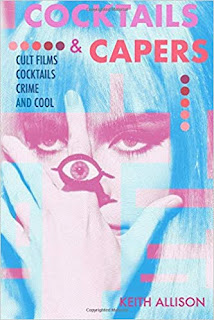I don't know about you, but last year was pretty busy for me. In fact, 2018 was the year when I finally started asking myself whether I had maybe taken on just a few too many projects. Then I would occasionally look up, bleary eyed, from my keyboard to contemplate what I would do without the firehose stream of literary, musical, web-based and broadcast projects I'd taken on--with the inevitable answer being that I would be paralyzed with fear and worry at the state of the world. So I had no choice but to say "Bring it on, 2018!"
For starters, 2018 was the year in which I published my second novel, So Good It's Bad. As you may know, that novel and it's predecessor, Please Don't Be Waiting For Me, make up the first and second installments of a trilogy that I'm calling The SF Punk Trio. Said trilogy concerns a tight-knit gang of teenage punk rockers who continually find trouble in the shadowy corners of 1980s San Francisco. The third and final installment, Never Divided, will be released in July of 2019. That one will take place in 1984, against the backdrop of that year's Democratic Convention and it's attendant protests. There will also be a covert gang of racist cops within the SFPD.

In the podcasting realm, I entered my fourth year of acting as co-host on Ken Brosson's Taiwan Noir podcast, which is just a small cog in his massive Podcast on Fire empire. Though our release schedule slowed down this year (partly due to my busy schedule) I am proud that this year's episodes focused heavily on those goofy Taiwanese fantasies most beloved by me like Nine Demons, Hello Dracula and Fantasy Mission Force.
Meanwhile, my solo podcast, Friday's Best Pop Song Ever, clocked in a total of 14 episodes over the course of the year, with a 15th due in January of 2019. This is a podcast in which I take a more-or-less obscure pop song that I am particularly fond of and nerd the fuck out over it, providing context, commentary and personal observations. What I am most proud of is it's brevity, with episodes lasting from eight to eighteen minutes--in contrast to the bloated length of most podcasts, because just having breath in your body doesn't mean you have something to say. My most listened to episodes so far have been the ones focused on "Pretty Please" by The Quick, "Haunted" by the Pogues, and Kristy MacColl's "They Don't Know." The show is available on Stitcher, so, yes, I'm going to ask you to subscribe to it. And, hey, would it kill you to also rate and review it as well?
And last, but far from least, is 4DK, which I still consider the flagship of my whole operation, despite my falling far short of my original posting goal of 1-2 reviews a week. And though it might sometimes seem like the blog has become a bulletin board for all my activities elsewhere, I want you all to know that I still consider it to be primarily a film review blog and that, in keeping with that, I will continue to review films on it, albeit with the occasional lull. Happily, I've found that, despite the proliferation of film blogs, podcasts, and cult films on YouTube, there are still plenty of weird, obscure and even great movies to be found. Among my favorite films I reviewed this year were Banglar Robocop, the Indian CG monster-fest Creature, Abar: Black Superman, Fantasy Mission Force, Supersonic Saucer, Femina Ridens and Stray Cat Rock: Delinquent Girl Boss, to name a few.
Of course, what I am leaving out of all of this are the things that I'm currently working on for next year, such as a follow-up to Funky Bollywood and a musical. Those will have to wait until later, because I think it would be distasteful to make the first post of the year the longest. Also, I want to refer back to this post whenever I'm wondering why I feel so tired all the time.
Happy new year, everybody.


































































































